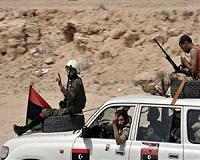| . |  |
. |
Tel Aviv, Israel (UPI) Apr 5, 2011 Israel and Hamas appear to be heading for another "mini-war" as the Jewish state indicts a Palestinian engineer, captured in Ukraine, for masterminding Hamas' rocket program and the Israeli army reportedly gets ready to assassinate Hamas leaders. On Monday, Dirar Abu Sisi was accused of developing rockets and missiles for Hamas, which has controlled the Gaza Strip since June 2007, for use against the Jewish state and on hundreds of counts of attempted murder. The case has been shrouded in mystery since Abu Sisi disappeared Feb. 19 from a train in Ukraine, apparently kidnapped by Israeli agents and covertly transported to Israel. The main thrust of the Israeli charges was that the 42-year-old Gazan, director of the territory's only power station, was responsible for the alarming improvement in the range and destructive power of Hamas' rockets over the last five years to the point they now threaten key population centers. Abu Sisi denied all the charges when he appeared in court in the southern city of Beersheba, one of the Israeli cities now within range of Hamas weapons. Meantime, the Hebrew Web site of the leading daily Yediot Ahronot reported Monday the army is poised to resume assassinating militant Palestinian leaders to deter Hamas. That would mark a sharp escalation in the violence. Israeli warplanes have repeatedly attacked the Hamas-ruled Gaza Strip in recent days to halt rocket attacks. A dozen Palestinians have been killed. The Israelis are alarmed at the Palestinians' use of weapons, believed to be largely supplied by Iran, that have a range of more than 40 miles, enough to reach southern cities like Beersheba and Ashkelon. One Grad rocket fired from Gaza struck within 16 miles of the Tel Aviv metropolitan area, where some 2 million Israelis live and work. At one point, 54 mortar shells and rockets were fired into Israel in a 10-minute barrage, the heaviest since Israel invaded Gaza Dec. 27, 2008, in Operation Cast Lead that was intended to crush Hamas. It isn't clear whether the March 11 killing of five members of an Israeli family in the West Bank or a March 22 bombing in Jerusalem -- the first in the holy city since 2008 -- that killed a British woman and wounded 34 other people were linked to Hamas. But they were clearly intended to provoke Israel, just as Abu Sisi's apparent abduction and trial has provoked Hamas. "What began as a local escalation is steadily transforming into a broader conflict that the two sides will apparently have difficulty stopping, though it's doubtful either side has an interest in reaching that point," analysts Amos Harel and Avi Issacharoff observed in the liberal Haaretz daily. "Israelis' anxiety is rising and with it the fear that outside parties" -- read Iran -- "might seek to provoke hostilities to divert attention from domestic problems and shift the focus back to Israel," the International Crisis Group in Brussels warned. "Hamas has been emboldened by regional events and is therefore less likely to back down from a challenge. The combination, as recent days have shown, has proven combustible." Israeli leaders have warned several times in recent days that Prime Minister Binyamin Netanyahu's right-wing coalition government may decide that another invasion of Gaza is necessary. Israel was widely condemned internationally for the 22-day Operation Cast Lead in the winter of 2008-09 in which some 1,400 Palestinians, mostly civilians, were killed, for the loss of 13 Israelis. The global opprobrium incensed and badly jolted Israel. Launching another major assault on Gaza could well trigger further denunciations of the Jewish state amid its fears that the Feb. 11 fall of Egyptian President Hosni Mubarak could result in the unraveling of its landmark 1979 peace treaty with Cairo. "Despite the escalation," Harel and Issacharoff wrote, "Hamas does not seem to want large-scale clashes yet. The organization actually has good reasons to believe that Israel is the one heating up the southern front." There are suspicions that it's not Hamas who's responsible for the recent violence, but the smaller and more extreme Islamic Jihad. IJ is far closer to Iran than Hamas and these days Tehran has considerable interest in stirring up trouble. But Hamas still calls the shots in Gaza.
Share This Article With Planet Earth
Related Links
 US says envoy in Libya for talks with opposition
US says envoy in Libya for talks with oppositionWashington (AFP) April 5, 2011 A senior US diplomat arrived Tuesday in rebel-held eastern Libya for talks with the opposition about its political aims and the provision of humanitarian aid, the State Department said. The envoy, Chris Stevens, "has arrived in Benghazi and he's meeting with members of the Transitional National Council (TNC)," Mark Toner, a State Department spokesman, told reporters. The talks will focus ... read more |
|
| The content herein, unless otherwise known to be public domain, are Copyright 1995-2010 - SpaceDaily. AFP and UPI Wire Stories are copyright Agence France-Presse and United Press International. ESA Portal Reports are copyright European Space Agency. All NASA sourced material is public domain. Additional copyrights may apply in whole or part to other bona fide parties. Advertising does not imply endorsement,agreement or approval of any opinions, statements or information provided by SpaceDaily on any Web page published or hosted by SpaceDaily. Privacy Statement |